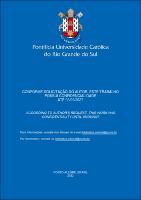| Share record |


|
Please use this identifier to cite or link to this item:
https://tede2.pucrs.br/tede2/handle/tede/10194| Document type: | Dissertação |
| Title: | Teletrabalho e desconexão : a saúde psicológica do trabalhador em estudo comparado Brasil e Argentina |
| Author: | Moreira, Laura Medina Martins  |
| Advisor: | Fincato, Denise Pires |
| Abstract (native): | O presente estudo, vinculado à linha de pesquisa de Direito, Ciência, Tecnologia & Inovação, do Programa de Pós-Graduação em Direito da Pontifícia Universidade Católica do Rio Grande do Sul, busca analisar, a partir do modelo legislativo argentino, advindo através da Lei nº 27.555/20, formas de promover a desconexão e, por consequência, garantir à saúde psicológica do teletrabalhador. Destaca-se o modelo contratual do teletrabalho e as suas bases legais no Brasil e na Argentina, as suas diferenças, partindo de pressupostos teóricos, jurisprudenciais e legais, para promover a análise em perspectiva comparada, identificando e enfrentando os problemas decorrentes de implementação do teletrabalho em caráter de urgência, decorrente da crise ocorrida através da pandemia da COVID-19. Investiga as posições doutrinárias, legais e jurisprudenciais no tocante ao direito a desconexão. Verifica ainda se a desconexão está inserida como um direito fundamental e se é possível garanti-la no teletrabalho. Identifica os avanços na legislação argentina e de que forma podem auxiliar o Brasil, em especial as mudanças constantes no Projeto de Lei nº 5.581/20, no tópico referente a saúde psicológica do teletrabalhador, ao normatizar expressamente o direito à desconexão, deixando de ser matéria apenas existente na doutrina e jurisprudência em analogia a violação aos direitos da personalidade. Concluiu-se que a legislação argentina está servindo de vanguarda no tocante ao direito à desconexão e proteção à saúde psicológica do teletrabalhador, estando a frente, portanto, de diversos países, inclusive do Brasil, ao normatizar o direito à desconexão expressamente, ainda que venha a trazer determinações que dependam de maiores discussões, a exemplo do direito do teletrabalhador de, unilateralmente, sem aviso prévio, revogar o consentimento dado para laborar em regime de teletrabalho, devendo o empregador realocá-lo, sob pena de até mesmo existir uma espécie de rescisão indireta. |
| Abstract (english): | The present study, linked to the research line of Law, Science, Technology & Innovation, of the Graduate Program in Law of the Pontifical Catholic University of Rio Grande do Sul, seeks to analyze, from the Argentine legislative model, arising through the Law nº 27.555/20, ways to promote disconnection and, consequently, guarantee the psychological health of teleworkers. We highlight the contractual model of telework and its legal bases in Brazil and Argentina, their differences, based on theoretical, jurisprudential and legal assumptions, to promote the analysis in a comparative perspective, identifying and facing the problems arising from the implementation of telework as a matter of urgency, resulting from the crisis that occurred through the COVID-19 pandemic. Investigates doctrinal, legal and jurisprudential positions regarding the right to disconnect. It also verifies if disconnection is inserted as a fundamental right and if it is possible to guarantee it in telework. Identifies the advances in Argentine legislation and how they can help Brazil, in particular the constant changes in Bill Nº, 5.581/20, in the topic referring to the psychological health of teleworkers, by expressly regulating disconnection, ceasing to be a matter that only exists in the doctrine and the prescription in analogy to the right to refer to the rights of the personality. It was concluded that the Argentine legislation is serving as a vanguard with regard to the right to disconnection and protection to the psychological health of teleworkers, being ahead, therefore, of several countries, including Brazil, in regulating the right to disconnection expressly, even if it comes to bring determinations that depend on further discussions, such as the teleworker's right to, unilaterally, without prior notice, revoke the consent given to work in a telework regime, with the employer having to relocate it, under penalty of even having a kind of indirect termination. |
| Keywords: | Hiperconexão Síndrome de Burnout Teletrabalho Direito Comparado Teletrabalho Brasil Argentina Reforma Trabalhista Hyperconnection Burnout Syndrome Disconnection Telework Comparative Law Brazil Argentina Labor Reform |
| CNPQ Knowledge Areas: | CIENCIAS SOCIAIS APLICADAS::DIREITO |
| Language: | por |
| Country: | Brasil |
| Publisher: | Pontifícia Universidade Católica do Rio Grande do Sul |
| Institution Acronym: | PUCRS |
| Department: | Escola de Direito |
| Program: | Programa de Pós-Graduação em Direito |
| Access type: | Acesso Aberto |
| Fulltext access restriction: | Trabalho será publicado como artigo ou livro |
| Time to release fulltext: | 60 meses |
| Date to release fulltext: | 06/05/2027 |
| URI: | https://tede2.pucrs.br/tede2/handle/tede/10194 |
| Issue Date: | 7-Mar-2022 |
| Appears in Collections: | Programa de Pós-Graduação em Direito |
Files in This Item:
| File | Description | Size | Format | |
|---|---|---|---|---|
| DIS_LAURA_MEDINA_MARTINS_ MOREIRA_CONFIDENCIAL.pdf | LAURA_MEDINA_MARTINS_MOREIRA_DIS | 545.84 kB | Adobe PDF |  Download/Open Preview |
Items in DSpace are protected by copyright, with all rights reserved, unless otherwise indicated.




